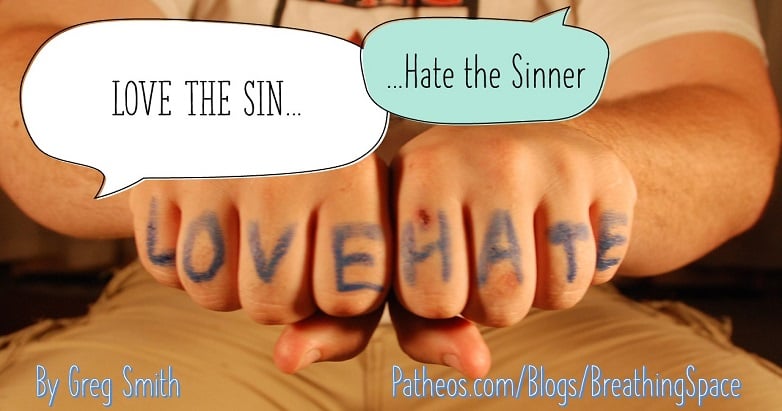No, I didn’t get the title backwards. Contrary to the popular Christian aphorism that says, “Love The sinner; hate the sin,” many Christians do it the other way around.

I’m reminded of Fred Phelps and his Westboro Baptist Church. Picketing funerals and other events, they brandished signs that read, “God hates fags.” Their brand of Christianity turns my stomach and illustrates the fact that they really love the sin and hate the sinner.
Something to Oppose
They love the sin because it gives them something to oppose. Their Christianity is a religion of rules, their Bible a playbook of dos and don’ts. Their God needs a devil, and his followers need an enemy to fight. These “Onward Christian Soldiers, marching as to war” wouldn’t know how to be Christians if they didn’t have someone to fight. They love the sin because it gives them an excuse to hate the sinner.
Take a look at just a partial history of American Evangelicals, and all the battles they have fought through the past century:
- Prohibition
- The war on drugs
- “Don’t say gay” laws
- The pro-birth movement
- Fighting the equal Rights amendment
- LGBTQ marriage rights
- Opposing interracial marriage
- Boycotting Disney
- Condemnation of heavy metal, rap, rock, and jazz music
- Forbidding dancing to any music
- Prohibiting playing cards
- Outlawing movies
A quick review of all the battles fought by the Evangelical Church in the past century indicates their desire to wage war on society. There’s even a whole denomination called The Salvation Army, where members earn ranks and wear uniforms to indicate their united front against sin. Without all the things they stand against, Evangelicals would not have the license to hate the sinners. So, they love the sin. They need the sin. Without it, there would be no sinners to resist.
The Pro-Birth Movement
Today, many pro-birth demonstrators do the same thing. It’s evident that they love the sin because it gives them someone to hate. It’s obvious that they hate the sinner. Nothing but hate would motivate people to support policies and pass laws that take away a woman’s bodily autonomy, and then fail to create social structures and financial resources to care for those same children whose birth they mandated by law. These evangelicals are pro birth rather than pro-life. Nothing but hate for the sinner could motivate that.
A Legacy of Hate
Fred Phelps is dead, but his legacy of hate continues. Even if they don’t quote his placards, conservatives uphold his ideals of loving the sin but hating the sinner. Knowing that the times are past when they could deny mixed race marriages or bathroom rights to people of color, they turn now to LGBTQ folks and try to impose on them the same restrictions. Skin color was an excuse. Gender identity and sexual orientation are an excuse. The goal is just to find someone to hate. Right now, sin seems as good a reason as any.
Stop Saying This…
Christians need to stop using the phrase, “Love The sinner; hate the sin” for two reasons:
- The word “sinner” smacks of judgment. It defines a person by their action. Rather than a person who commits adultery, for example, the word “sinner” defines the person as an adulterer. Instead of a child of God who told a lie, the word “sinner” identifies that person as a liar. The word defines a person by what they do. This is a very human notion, and it demonstrates a limited vision. God’s vision of us is much bigger than that. God defines us in light of who God is, rather than defining us by things we have done. To define someone as a sinner supposes we have the right to judge—but that job is left to God alone.
- The word “hate” eclipses everything else in the sentence. People who identify with the thing you are calling “sin” will not perceive your love for them. Because you have used the word “hate,” all they will hear is what you hate about them. Even if you have the best intentions, even if you truly do love them, that’s not what they will hear when you use this phrase.
Instead, Say This…
You may ask, if I shouldn’t say, “Love the sinner; hate the sin,” what should I say to express my disapproval?
You might try, “Love the person; want better things for them.” Once we stop labeling everyone as a sinner, it makes them easier to love. You can just love the person, without seeing them through the lens of whatever you believe to be their wrongdoing. Loving someone means seeing the good in them. It’s hard to do this when you are always looking at the bad in them. It’s better to assume the best in someone. In fact, the more you love someone, the more their positive characteristics eclipse their negative ones. Sure, you still see those things that are harmful in their lives. But you don’t define them by these things. You define them by love.
Or you could try, “I feel for you,” instead of being blinded by hate. When you hate something about a person, generally that’s all you can see about them. God does not hate the sin. God has compassion instead. God’s first desire is to forgive and restore. Hate seeks only to punish, but love seeks to heal. I heard someone say, “I have enough sins of my own to deal with, so I don’t need to go around hating everyone else’s.” When you love someone, you don’t hate their sin. You want better things for them, and you compassionately work to help them improve.
Check Yourself
So, the next time you’re tempted to say, love the sinner, hate the sin, stop and check yourself. Think about how this will sound to the ears of the person who identifies with the things you are judging. Instead of saying that harmful phrase, you can try saying, “Love the person; want better for them.” Or “I feel for you.” And if you can’t get to a place of non-judgmental compassion, you might try saying nothing. Realize that you don’t need to express your disapproval at all. This way, maybe they will feel the love you say you feel for them.












